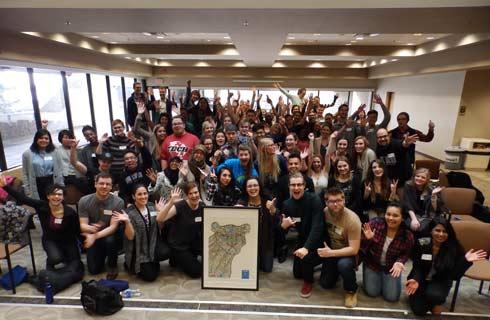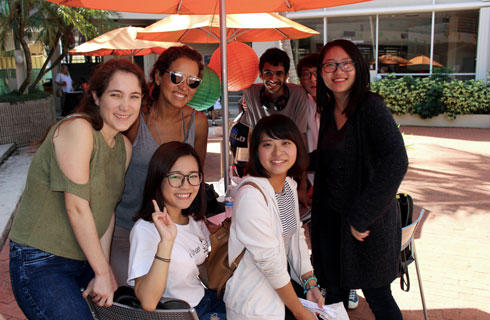哲学博士(文化研究)
Doctor of Philosophy (Cultural Studies)

学历文凭
Ph.D.

专业院系

开学时间

课程时长

课程学费

国际学生入学条件
IDP—雅思考试联合主办方

雅思考试总分
- 雅思总分:
- 托福网考总分:
- 托福笔试总分:
- 其他语言考试:
CRICOS代码: 056223M
申请截止日期: 请与IDP联系 以获取详细信息。
课程简介
Film, Media and Cultural Studies (FMCS) at the University of Newcastle offers a wide range of research experience and supervision expertise. FMCS PhD and MPhil candidates undertake research work enabling the development of important transferable personal and professional postgraduate skills including: high-level information sourcing, processing and interpreting, critical analysis, lateral thinking, adaptability, oral and written communication, creativity and initiative, and institutional engagement. You will benefit from our strengths in film theory and history; television studies; gender and sexuality in the media; film and philosophy, popular music and culture; the Internet and social media; audiences and consumption; identity and taste in consumer culture; media structures and institutions; and new media technologies. FMCS is a small but productive discipline of researchers publishing in diverse, often interdisciplinary areas, such as sociology, literature, history, philosophy, and creative and performing arts. Recent research outputs in the discipline include books, book chapters and peer-reviewed journal articles, as well as a range of other diverse publications.
相关申请
 预科
预科 奖学金
奖学金 实习机会
实习机会 在校学习
在校学习 跨境学习
跨境学习 校园授课-线上开始
校园授课-线上开始 在线/远程学习
在线/远程学习
开学时间&学费
学费信息仅供参考,请与IDP联系以获取详细信息
| 开学时间 | 时长 | 学费 | 地点 |
|---|
学校排名

世界排名301
数据源:
泰晤士高等教育世界大学排名
关于纽卡斯尔大学

澳大利亚纽卡斯尔大学是一所领先的学府,以高质量的教学和学习以及令人兴奋的现代学术课程而享有盛誉。各自领域的佼佼者教育学生,学生毕业后可在全球范围内发挥影响力。大学是研究密集型学府,根据2026 QS世界大学排名和世界高等教育数据库位列世界前1%。根据QS 2025年世界大学学科排名,它在自动化和控制、土木和结构工程、矿产和采矿工程、护理、医学、建筑和建筑环境、环境科学、教育等学科领域表现出色,共有12门学科跻身世界前200名。根据《泰晤士报》2025年高等教育影响力排名,该大学在全球影响力排名中排名第40位,在《泰晤士报》2025年高等教育影响排名中,在气候行动方面排名第 二作为澳大利亚领先的地区经济体,学生在学习期间可以获得广泛的职业道路和机会来建立就业能力。通过实习、行业实习、志愿服务和兼职工作,学生可以获得宝贵的经验并发展实践技能。作为纽卡斯尔和亨特地区唯一的大学,该大学拥有强大的行业联系,并为学生提供现实世界的经验。此外,那些选择在纽卡斯尔大学学习的人可能会获得学习后工作的机会。纽卡斯尔大学和中央海岸校区都为国际毕业生提供了诸多便利。每个校区都拥有大城市的各种设施,拥有由友好的服务人员和资源团队支持的梦幻般的现代化校园。此外,每个地点都比澳大利亚主要城市更实惠,校园和周边地区都是安全可靠的,这意味着学生可以放心地专注于他们的学习和大学经历。
本校相关课程

专业会计研究生证书
学历文凭
Graduate Certificate
开学日期
课程费用总额


社会科学学士(荣誉学位)
学历文凭
Bachelor Degree with Honours
开学日期
课程费用总额


信息技术学士/商科学士
学历文凭
Dual Degree
开学日期
课程费用总额


环境科学与管理学士(荣誉学位)
学历文凭
Bachelor Degree with Honours
开学日期
课程费用总额


运动与运动科学学士
学历文凭
Bachelor Degree
开学日期
课程费用总额


信息技术学士(荣誉学位)
学历文凭
Bachelor Degree with Honours
开学日期
课程费用总额

其他相关课程

艺术与文化管理硕士
 墨尔本大学
墨尔本大学学历文凭
Masters Degree (Coursework)
开学日期
课程费用总额


商业硕士(研究)
 斯威本科技大学
斯威本科技大学泰晤士高等教育世界大学排名:282
学历文凭
Masters Degree (Research)
开学日期
课程费用总额


犯罪学学士学位
 新英格兰大学
新英格兰大学学历文凭
Bachelor Degree with Honours
开学日期
课程费用总额


Study Abroad - JNSBA
 维多利亚大学
维多利亚大学泰晤士高等教育世界大学排名:602
学历文凭
Study Abroad
开学日期
课程费用总额


文理科学士学位
 悉尼大学
悉尼大学泰晤士高等教育世界大学排名:54
学历文凭
Bachelor Degree
开学日期
课程费用总额


犯罪学硕士(专业)
 邦德大学
邦德大学泰晤士高等教育世界大学排名:412
学历文凭
Masters Degree (Coursework)
开学日期
课程费用总额










